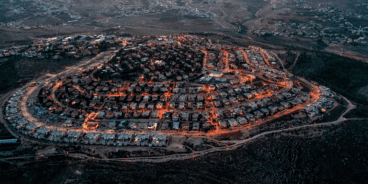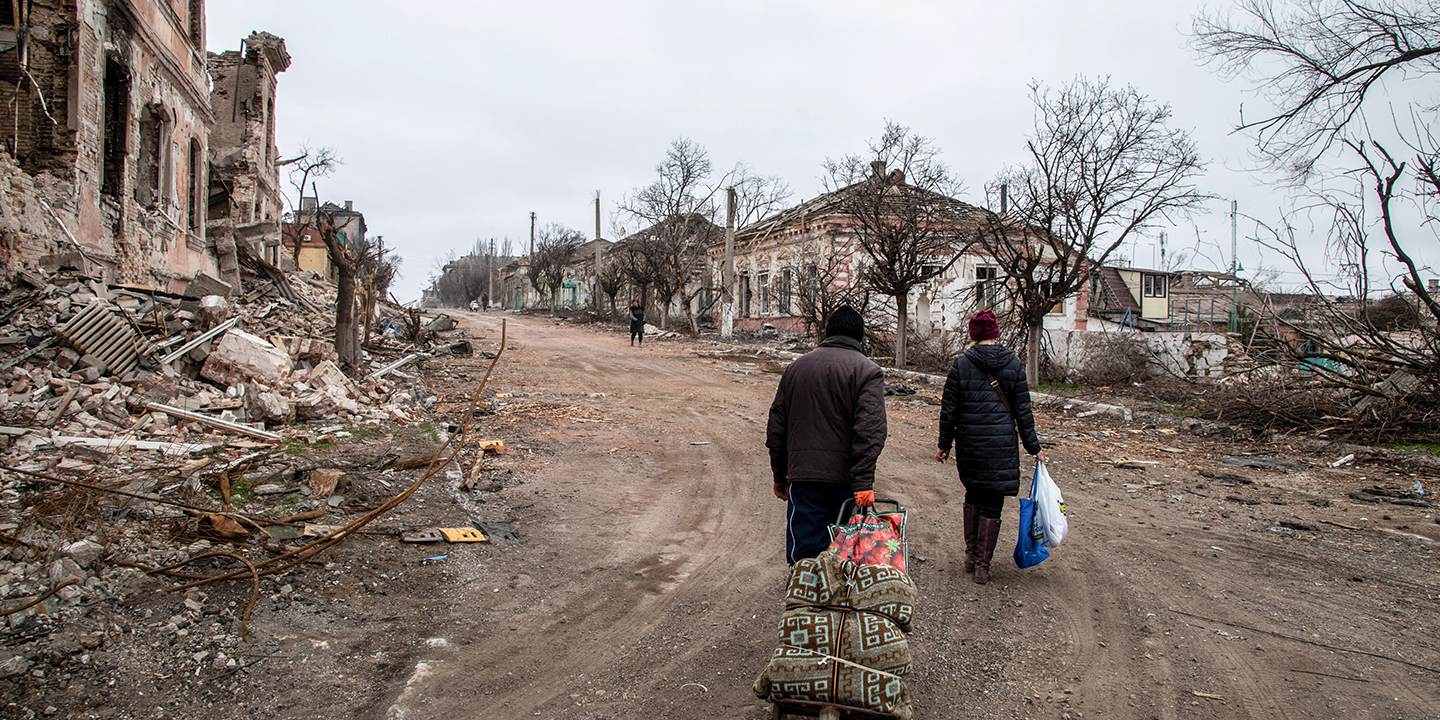

Atrocity Alert No. 302: Ukraine, Israel and the Occupied Palestinian Territory and Food Insecurity
Atrocity Alert is a weekly publication by the Global Centre for the Responsibility to Protect highlighting situations where populations are at risk of, or are enduring, mass atrocity crimes.
FIRST TRIALS BEGIN AMIDST MOUNTING EVIDENCE OF WAR CRIMES IN UKRAINE
On 23 May Russian Sergeant Vadim Shishimarin was convicted of shooting and killing a civilian, Oleksandr Shelipov, in the Sumy region of Ukraine on 28 February, and sentenced to life in prison in the first trial for abuses committed since the Russian invasion started three months ago. According to the Ukrainian Prosecutor General, Iryna Venediktova, Shishimarin and other Russian troops encountered Shelipov and shot at him to prevent him from relaying their position to Ukrainian authorities. Shishimarin’s defense claimed he shot at Shelipov after refusing multiple orders to do so, fearing for his own safety.
This inaugural trial takes place as evidence continues to mount of atrocities being committed in Ukraine. Prosecutor General Venediktova indicated that her office is preparing cases against 41 Russian soldiers for various offenses that could amount to war crimes and crimes against humanity, including targeting civilian infrastructure, targeted killings of civilians, rape and sexual violence, and looting. The prosecutor’s office announced it is investigating over 13,000 possible war crimes that involve over 600 suspects, including Russian military and government officials.
Evidence of abuses continues to be gathered by the UN and non-governmental organizations. On 18 May Human Rights Watch released a report documenting apparent war crimes carried out by Russian soldiers in the Kyiv and Chernihiv regions, including summary executions, unlawful killings, enforced disappearances and torture between 27 February and 14 March. The Office of the UN High Commissioner for Human Rights has also documented the apparent use of indiscriminate weapons by Ukrainian forces causing civilian casualties and damage to civilian objects in eastern Ukraine. The UN Human Rights Monitoring Mission in Ukraine has confirmed at least 3,900 civilians have been killed, including 250 children, while acknowledging the real toll is likely much higher.
Fighting remains ongoing in Ukraine’s eastern Donbas region, where Russian forces seemingly aim to take control of the Donetsk and Luhansk regions. Ukrainian President Volodymyr Zelensky said Russian attacks in Donbas have utterly devastated the area, stating that “it’s hell there, and that’s no exaggeration.”
Since 24 February the conflict has internally displaced 8 million people and forced an additional 6 million to flee across the border. According to the UN Refugee Agency, “the Ukraine war and other conflicts pushed the number of people forced to flee conflict, violence, human rights violations and persecution over the staggering milestone of 100 million for the first time on record.”
Ensuring accountability and justice for crimes committed in Ukraine is paramount to ending further violations. The Global Centre for the Responsibility to Protect’s expert on the situation in Ukraine, Sarah Hunter, said “while we should commend these early trials, as well as the extensive evidence collected by international mechanisms that may be used in future accountability proceedings, both parties currently seem committed to military gains and civilian harm has not subsided. International efforts should focus on restarting communication towards peace.” The international community must support efforts to ensure trials are impartial and include all perpetrators, regardless of rank, nationality or affiliation.
OVER 1,000 PALESTINIANS FACING IMMINENT RISK OF FORCIBLE TRANSFER
On 4 May the Israeli High Court of Justice rejected appeals against eviction orders issued to Palestinian inhabitants of a collection of villages known as Masafer Yatta in the occupied West Bank. The ruling ends two decades of legal proceedings and allows the Israeli government to forcibly evict the 1,200 Palestinians, including 500 children, in Masafer Yatta in order to repurpose the land for military use. Demolitions of Palestinian homes and workshops in Masafer Yatta have already begun. Forced evictions, arbitrary displacement and forcible transfer of Palestinian communities are serious violations of international humanitarian and human rights law.
UN Secretary-General António Guterres and the Resident and Humanitarian Coordinator in the Occupied Palestinian Territory (OPT), Lynn Hastings, called on Israel to cease all demolitions and evictions in line with its international law obligations. A group of UN Special Rapporteurs also raised alarm, stating that, “by upholding this policy to drive Palestinians out of Masafer Yatta, the Israeli judicial system has given carte blanche to the Israeli Government,” emphasizing that a judiciary “that perpetuates the violations of fundamental human rights of people who have been under military occupation for 55 years, becomes itself part of the structural system of oppression.”
According to the UN Office for the Coordination of Humanitarian Affairs, at least 911 Palestinian-owned structures were demolished or seized by Israeli government authorities in 2021, forcibly displacing over 1,200 Palestinians. An additional 257 structures have been demolished in 2022 so far. Many of these demolitions take place in order to make way for illegal Israeli settlements.
The UN Special Rapporteur on the situation of human rights in the OPT determined in July 2021 that Israel’s illegal settlement expansion aims to permanently alter the ethnic demographics of occupied Palestine and amounts to a war crime. Israel’s plans to expand Jewish settlements on occupied land also involves increasingly harsh methods of subjugation of Palestinians. In 2021 violence perpetrated by Israeli settlers against Palestinians reached the highest level ever recorded, with over 490 violent attacks directed against rural Palestinian families.
The international community must impose accountability measures on Israel as an occupying power that is perpetrating possible atrocity crimes, including forcible transfer. UN member states must also use all available diplomatic, political and economic measures prescribed by the UN Charter to halt Israeli violations. The government of Israel must immediately comply with international law obligations and cease demolitions and evictions targeting Palestinians.
WORLDWIDE HUNGER CATASTROPHE FUELED BY CONFLICT AND ATROCITIES
According to the World Food Programme (WFP), over 276 million people are facing acute hunger around the world and the conflict in Ukraine may push an additional 46 million people to severe food insecurity. The conflict has global implications resulting from economic sanctions and Russia and Ukraine’s role as major exporters of grain and cooking oils.
On 19 May the UN Security Council (UNSC) held a debate on conflict and food insecurity in the context of the ongoing war in Ukraine, which has added a “frightening new dimension” to global hunger. Marking the fourth anniversary of UNSC Resolution 2417 on 24 May, Margot van der Velden, Head of the Emergencies Department at the WFP, asserted that, “the Ukraine conflict has caused upheaval in global food and energy markets, with soaring food and fuel prices putting millions at risk of hunger across the world.”
Food security inevitably deteriorates when communities are forcibly displaced from their homes, land and jobs due to fighting. Similarly, hunger can exacerbate conflict, as food shortages deepen existing grievances, fueling tensions that may incite violence. According to the WFP, 60 percent of the world’s hungry people live in conflict zones, including Afghanistan, the Democratic Republic of the Congo, Ethiopia, Nigeria, South Sudan, Sudan, Syria and Yemen. In all of these countries, populations are also facing atrocity crimes. According to the International Rescue Committee, the current humanitarian crisis in Afghanistan – which has deepened since the Taliban takeover in August 2021 – could result in more deaths “than twenty years of war.”
Parties to conflicts around the world have also used deliberate starvation as a tactic of war. Throughout the conflict in northern Ethiopia, there have been widespread reports of the deliberate burning of crops, looting of warehouses and aid convoys, and slaughtering of livestock. UN officials have asserted that access to food has been used as a weapon of war. In Yemen humanitarian aid has been systematically blocked, resulting in the largest humanitarian crisis in the world, and UN experts have reported that parties to the conflict may have used starvation of civilians as a military tactic. Starvation as a weapon of war may constitute a war crime and is prohibited under International Humanitarian Law (IHL) and customary law.
Food should never be weaponized. Under IHL access to humanitarian relief and lifesaving goods are protected. The international community must support more long-term investment in development to break the deadly cycle of hunger and conflict by providing additional resources towards political solutions to end conflicts and prevent their occurrence, as well as strengthening sustainable food systems to protect them from future shock.
Related Content


Atrocity Alert No. 403: Israel and the Occupied Palestinian Territory, Sudan and the UN Human Rights Council
